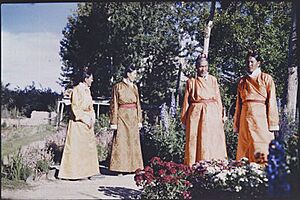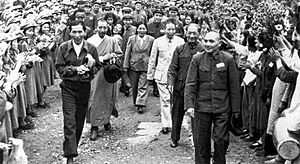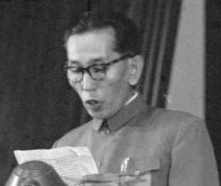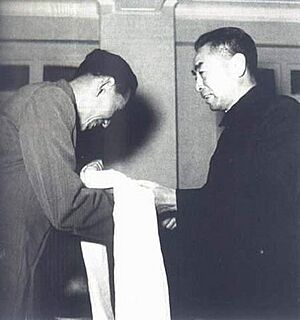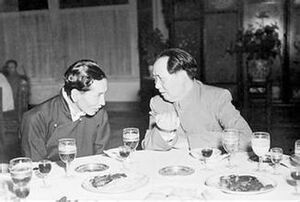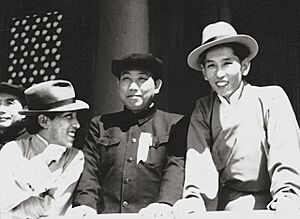Ngapoi Ngawang Jigme facts for kids
Quick facts for kids
Ngapoi Ngawang Jigme
|
|
|---|---|
| ང་ཕོད་ངག་དབང་འཇིགས་མེད་ 阿沛·阿旺晋美 |
|
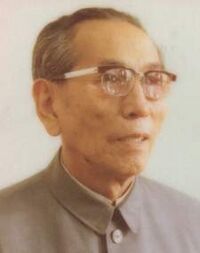 |
|
| Vice Chairman of the Chinese People's Political Consultative Conference | |
| In office 15 March 1993 – 23 December 2009 |
|
| Chairman | Li Ruihuan→Jia Qinglin |
| In office 9 October 1959 – 21 December 1964 |
|
| Chairman | Zhou Enlai |
| Chairman of the Tibet Autonomous Region People's Congress | |
| In office February 1983 – January 1993 |
|
| Preceded by | Yang Dongsheng |
| Succeeded by | Raidi |
| In office August 1979 – April 1981 |
|
| Preceded by | new position |
| Succeeded by | Yang Dongsheng |
| Chairman of the Tibet Autonomous Region | |
| In office 1964–1968 |
|
| Preceded by | Choekyi Gyaltsen |
| Succeeded by | Zeng Yongya |
| In office 1981–1983 |
|
| Preceded by | Sanggyai Yexe |
| Succeeded by | Doje Cedain |
| Vice Chairman of the National People's Congress | |
| In office 4 January 1965 – 15 March 1993 |
|
| Chairman | Zhu De→Ye Jianying→Peng Zhen→Wan Li |
| Delegate to the National People's Congress | |
| In office September 1954 – December 1964 |
|
| Chairman | Liu Shaoqi→Zhu De |
| Kalön of Tibet | |
| In office 1950–1959 Serving with Thupten Kunkhen (until 1951), Kashopa Chogyal Nyima (1945–1949), Lhalu Tsewang Dorje (1946–1952), Dogan Penjor Rabgye (1949–1957), Khyenrab Wangchug (1951–1956), Liushar Thubten Tharpa (since 1955), Sampho Tsewang Rigzin (since 1957), and Surkhang Wangchen Gelek
|
|
| Monarch | 14th Dalai Lama |
| Governor of Domai | |
| In office August 1950 – October 1950 |
|
| Monarch | 14th Dalai Lama |
| Preceded by | Lhalu Tsewang Dorje |
| Succeeded by | title abolished |
| Personal details | |
| Born | February 1, 1910 Lhasa, Tibet, Qing Empire |
| Died | December 23, 2009 (aged 99) Beijing, People's Republic of China |
| Spouse | Ngapoi Cedain Zhoigar |
| Awards | |
| Military service | |
| Allegiance | |
| Branch/service | |
| Rank | |
| Commands | Deputy Commander, PLA Tibet Military District Kalön (minister), Kashag Commander-in-chief, Tibetan Army in Chamdo |
| Battles/wars | Battle of Chamdo |
Ngapoi Ngawang Jigme (Tibetan: ང་ཕོད་ངག་དབང་འཇིགས་མེད་, Wylie: Nga phod Ngag dbang 'jigs med, ZYPY: Ngapo Ngawang Jigmê, Lhasa dialect: [ŋɑ̀pø̂ː ŋɑ̀wɑŋ t͡ɕíʔmi]; Chinese: 阿沛·阿旺晋美; pinyin: Āpèi Āwàng Jìnměi; February 1, 1910 – December 23, 2009) was an important Tibetan official. He held many military and political jobs in Tibet both before and after 1951. In English, he is often called Ngapo.
Contents
Early Life and Education
Ngapoi Ngawang Jigme was born in Karma Gorge near Lhasa, Tibet. His family was a leading noble family, connected to former kings of Tibet. His father was a governor and military leader in Eastern Tibet.
Ngapoi studied traditional Tibetan literature. Later, he went to Britain for more education. He was married to Ngapoi Cedain Zhoigar, who was a leader in the Tibetan Women's Federation.
Career and Key Roles
After returning from his studies in Britain in 1932, Ngapoi served in the Tibetan army. He started his career as a local official in Chamdo in 1936. As a member of Tibet's government under the Dalai Lama, he supported making reforms. In April 1950, he became the governor-general of Chamdo.
| Ngapoi Ngawang Jigme | |||||||||
| Tibetan name | |||||||||
|---|---|---|---|---|---|---|---|---|---|
| Tibetan | ང་ཕོད་ངག་དབང་འཇིགས་མེད་ | ||||||||
|
|||||||||
| Chinese name | |||||||||
| Traditional Chinese | 阿沛·阿旺晉美 | ||||||||
| Simplified Chinese | 阿沛·阿旺晋美 | ||||||||
|
|||||||||
Commander of the Tibetan Army
While serving as governor-general of Chamdo, Ngapoi also became the leader of the Tibetan Army. He believed it was better to talk things out than to fight. He thought the Tibetan forces were not strong enough to stop the People's Liberation Army (PLA).
In October 1950, his forces met the People's Liberation Army. The battle ended quickly. Ngapoi surrendered Chamdo to the Chinese. The PLA treated him well and taught him about China's policies. Within a year, he became a deputy commander for the PLA in Tibet. He became a leader in Tibet and also within the Chinese Communist Party in Tibet.
Leading Peace Talks in Beijing
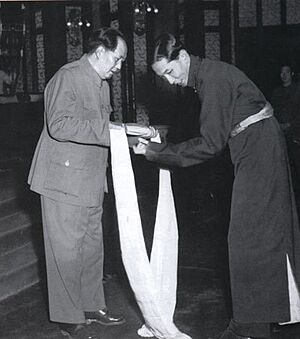
In 1951, Ngapoi led the Tibetan group sent to talk with the Chinese government in Beijing. There, he signed the Seventeen Point Agreement. This agreement accepted Chinese rule over Tibet. In return, it promised Tibet would have some self-rule and religious freedom.
Some people, especially those in the Tibetan community living outside Tibet, have questioned if his signature was truly valid. They say he was forced to sign. They also claim that as only the governor of Chamdo, he did not have the power to sign such an important agreement for all of Tibet.
However, others, including one of the Tibetan negotiators named Sambo Rimshi, said that the 14th Dalai Lama had given the group permission to go to Beijing and make decisions. Sambo recalled that the Dalai Lama told them to use their best judgment. Historians like Tom A. Grunfeld and Melvyn C. Goldstein also believe the Dalai Lama later approved the agreement.
In 1959, after leaving Tibet, the Dalai Lama said that the "17-point Agreement" was forced upon Tibet.
Supporting Reforms in Tibet
Ngapoi Ngawang Jigme was one of a few Tibetan leaders who wanted to modernize Tibet. He saw the return of the Chinese as a chance to make changes. He was similar to earlier reformers who wanted to improve Tibet but were stopped by conservative leaders.

Ngapoi was trusted by both the Chinese and the Dalai Lama. The Dalai Lama, who also wanted reforms, often talked privately with Ngapoi about political matters. Because of this trust, Ngapoi helped create new laws in 1953–1954. These laws changed things like interest rates and how counties were managed.
Later Political Roles
After 1951, Ngapoi continued his career within the Chinese government in Tibet. He was a leader of the Liberation Committee of Chamdo Prefecture until 1959. He also served on important national committees in China.
He was a Deputy Commander of the Tibet Military District from 1952 to 1977. In 1955, he was made a lieutenant general and received an award called the "Order of Liberation."
Establishing the Tibet Autonomous Region
In 1956, a committee was set up to prepare for the Tibet Autonomous Region (TAR). Ngapoi Ngawang Jigme was made its secretary general. In 1959, he became the vice-president of this committee.
Later, in 1965, Ngapoi Ngawang Jigme became the chairman of the People's Committee of the newly formed Tibet Autonomous Region.
National People's Congress
He represented Tibet in China's main law-making body, the National People's Congress. He served as a Vice Chairman of its Standing Committee from 1954 to 1988. He also led groups from the National People's Congress to other countries in the 1980s.
From 1979 to 1993, he was the Chairman of the National People's Congress Ethnic Affairs Committee.
Other Important Positions
Ngapoi was an honorary president of the Buddhist Association of China starting in 1980. He also became an honorary president of the Tibetan Wildlife Protection Association, which helps protect animals in Tibet. In 2004, he became president of the China Association for the Preservation and Development of Tibetan Culture.
Death and Legacy
Ngapoi Ngawang Jigme passed away on December 23, 2009, in Beijing. He was 99 years old. His funeral was held a few days later.
The Chinese Communist Party called him "a great patriot" and a "good son of Tibetan people." Many top Chinese leaders attended his funeral.
The Tibetan government in exile, led by Prof. Samdhong Rinpoche, also spoke kindly of him. They called him an "honest and patriotic" person who worked hard to keep the Tibetan language alive.
A journalist named Kalsang Rinchen noted that both China and the Tibetan government in exile seemed sad about his death. This shows how important Ngapoi was to both sides. Phuntsok Tashi, who was an interpreter during the 1951 peace talks, described Ngapoi as "an honest, clever, intelligent, experienced and far-seeing man."
Depiction in Film
In the 1997 movie Seven Years in Tibet, Ngapoi Ngawang Jigme is played by actor BD Wong. The movie shows him as someone who helped cause the defeat of the Tibetan army at Chamdo.
 | John T. Biggers |
 | Thomas Blackshear |
 | Mark Bradford |
 | Beverly Buchanan |


